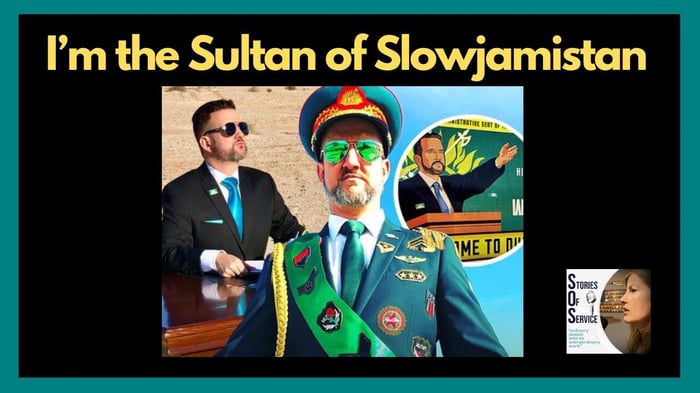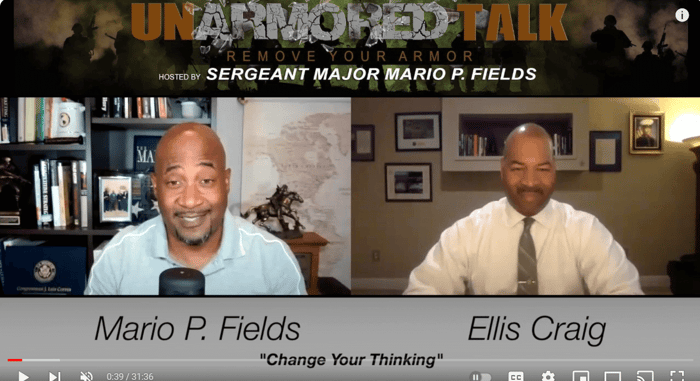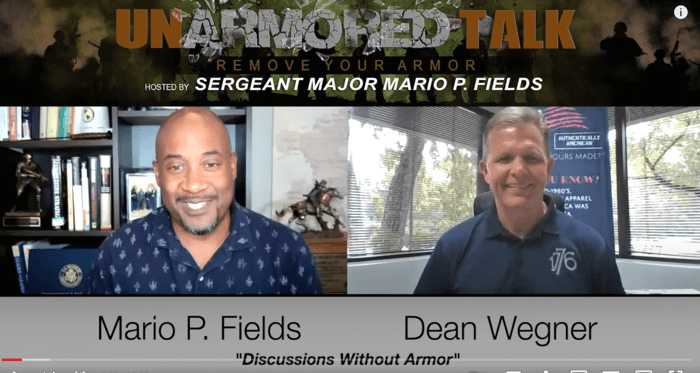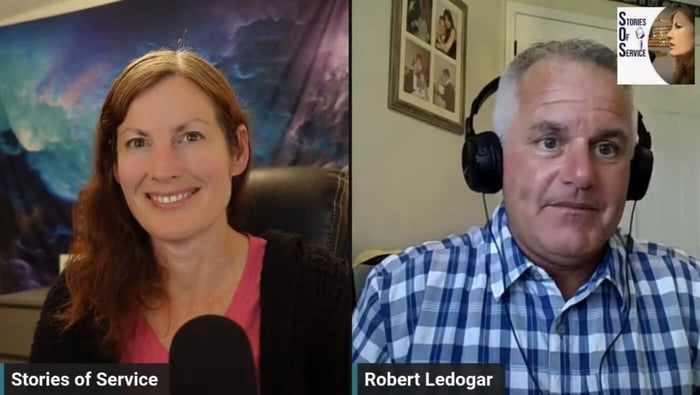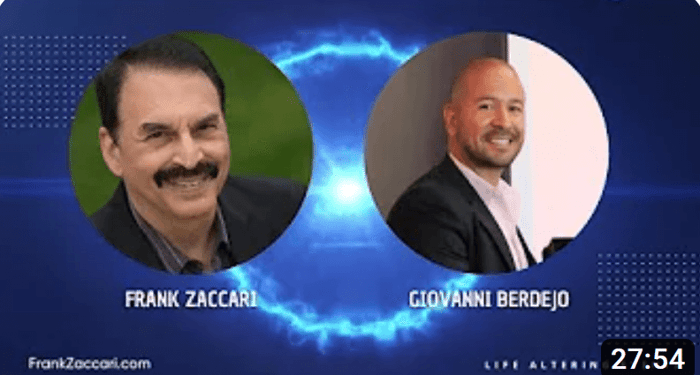In this episode, we're honored to welcome Larry Broughton, a former Green Beret whose life's journey encompasses remarkable triumphs and profound loss. Larry is not only an acclaimed entrepreneur and CEO of Broughton Hotels but also a best-selling author whose story of resilience resonates deeply with the human spirit.
Meet the Guest Larry Broughton

Larry Broughton's journey began with a commitment to the United States Army Special Forces, earning him the esteemed title of Green Beret. His time in the military instilled in him the qualities of determination, courage, and an unyielding spirit—attributes that would guide his path in the business world.
Transitioning from military service, Larry emerged as a standout entrepreneur, distinguishing himself with his pursuit of excellence and relentless hard work. Despite encountering economic challenges, notably during the pandemic, Larry's resilience prevailed. However, his life took an unforeseen turn with the tragic loss of his 17-year-old son in a car accident, a devastating event that tested his strength in unimaginable ways.
Amidst this heartbreaking loss, Larry chose to share his journey of healing, providing invaluable insights and guidance for others grappling with similar situations. His openness about the pain, the grieving process, and the strategies he employed to navigate through grief offer solace and guidance to those facing their own hardships.
Key Takeaways:
- The Journey: Larry's narrative encapsulates a diverse journey—serving in the military, navigating the business world's challenges, and enduring the tragic loss of his son.
- Community and Support: He emphasizes the significance of not withdrawing during times of grief but seeking solace in spiritual beliefs, reaching out to others, and engaging with support groups.
- Strength in Vulnerability: Larry advocates that exhibiting vulnerability demonstrates strength and courage. Acknowledging one's need for help is crucial.
- Navigating Grief: He shares his experiences with various therapies and alternative treatments that aided him in navigating the complex terrain of grief.
- Embracing Loss: Larry underscores that grief is an echo of profound love, and while the pain of loss may endure, it's possible to adapt and progress forward.
Discussion Points:
- Diverse Journey: From military service to business leadership and experiencing personal tragedy, Larry's journey encompasses multiple facets, offering invaluable insights.
- Community Support in Grief: Larry stresses the importance of seeking support and not isolating oneself during times of sorrow, highlighting the role of spiritual beliefs and support groups.
- Vulnerability and Strength: The conversation revolves around the notion that being vulnerable can be a demonstration of strength and courage, encouraging individuals to seek help when needed.
- Tools for Coping: Larry shares personal experiences with therapies and alternative treatments, providing a roadmap for others navigating their own grief.
- Adapting Through Loss: The acceptance that grief is an expression of deep love underscores Larry's perspective, acknowledging that while the pain may persist, adaptation and progression are feasible.
Listen to Podcast:
Watch Full Episode:
Resources:
- LinkedIn: https://www.linkedin.com/in/larrybroughton/
- broughtonHOTELS: https://broughtonhotels.com/
- The Compassionate Friends: https://www.compassionatefriends.org/
- Watch: Unarmored Talk Playlist
- Mario's Socials: Parade Deck
- Support My Nonprofit: Still Serving, Inc.
- Email: [email protected]
Transcripts by Buzzsprout:
(00:00)
Welcome back to unarmored talk podcast. Thank you so much for listening and watching each episode and continue pleased to share with your friends and family members and colleagues and don't forget to leave a rating or review if you feel this is a awesome show and you can connect to all of my social media on the parade deck just looking at show notes or you can put in the search engine Mario P.
(00:26)
Fields parade deck and get all access to my social media. Well, let's get ready to interview another guest who is willing to remove their armor to help other people. Everybody welcome back to unarmor talk podcast.
(00:40)
I'm your host Mario P. Fields and we have another amazing guest today Larry Broad and what's going on my friend. Hey buddy, how are you? It's so good to see you again. Thanks for having me here. Hey, it happens when it's supposed to happen, right?
(00:58)
And everybody too before I get to the you know, the professor introduction of Larry. He's in Orange County. He's in that so cow beautiful weather. Yeah, I miss it. I'm telling you so I'm living my life through you man.
(01:11)
Yeah, thank you. Yeah, you can't beat the weather here. That's for sure. We got other challenges, but the weather is not one of them. Right. Yeah, man. So before we get to our amazing guest today who's willing to remove his armor, have some discussions that hopefully helps you develop an accurate way of thinking if you experience any of these challenges that Larry had to experience.
(01:31)
Thank you everyone again for continuing to support this podcast. You guys know the deal. We keep growing and we keep developing, but the most important thing is we're helping at least one person. That's the goal.
(01:46)
That's the metric help one person per episode and you guys are helping me and the amazing 80 plus guests do that. So thank you so much and don't forget you want to learn more about my nonprofit go to www .stilteam .com.
(02:00)
serving Inc .com as this school year starts and we're gonna start cutting some more checks for these students in low -income communities here in North Carolina. Enough about that everyone. I have Larry, he is a United States Army veteran but not just a soldier there.
(02:18)
He's a Green Beret. Not everybody. Not everybody can do that. No, but he's you know from a special forces community. Also in the private sector, business, CEO, author and more. So I'm gonna shut up and turn it over to Larry, my friend.
(02:39)
Larry, welcome. Hey Mario, how are you? Good to see you. Man, I tell ya. If you could do me a favor, tell the listeners and viewers just a little bit about yourself Larry. Sure. You know I had a I had an author or a journalist describe me once as a schizophrenic entrepreneur.
(02:58)
I think he meant that in a good way, but the truth is I've got a lot of different interests, you know, and I think what most people know me for in the entrepreneurial space is that I've been in the hospitality space since I got out of the military and I kind of fell into this working at a motel in San Francisco and that ended up becoming one of the first boutique hotels in the country.
(03:25)
I became a partner in that hotel company and then after a few years had realized that I was a primary leader stuck in a secondary leadership role. You probably know what that's like, you've probably seen that in your career, right?
(03:37)
And so I just wasn't getting my needs met. So I went out and launched my own business and then over the years as we started seeing some pretty incredible success, I started speaking at events and then I started speaking all around the world on all kinds of things, mainly entrepreneurship and leadership based on my experience in the military first in special forces, as you had said.
(03:58)
And I've owned a few different businesses over the years. I do coaching and mentoring now of entrepreneurs and leaders and high achievers. I still do the hotel industry and over the last several years I've done a lot of TV and MSNBC, CNBC hotel, I'm sorry, travel channel, that kind of things.
(04:22)
So I am all over the place and as you said, I've got a couple of books out, a couple of bestsellers. I'm just still serving and that's my life. And the thing I'm most proud of though is that I'm a dad.
(04:38)
I'm a dad. So that's the most rewarding thing that I've ever done. Had no idea how awesome that was going to be. Yeah, there's no book in the library that gives us kind of the blueprint on how to be an effective father and everyone, if you guys want to check out the things that Larry's doing, making a huge impact globally, go to his LinkedIn page.
(05:01)
You know, again, I wanted to turn over Larry because I went on his LinkedIn page. I got my palm palms out. He talking about someone still serving. I mean, Larry turned it up. Well, let's I think when you, particularly for men, but I think for all humans, when you stop serving, you tend to lack your purpose.
(05:22)
And when you lack purpose, you start dying as far as I'm concerned. Hey, brother, you and I know people who have done the ultimate and that is that they've ended their own life. And besides the own demons that they're dealing with many times, it's as if they've lost their, they often say they lost their purpose.
(05:38)
They don't have the same meaning in their life that they used to have. I went through that phase in my life. I get it. I get it. Right. And so yes, I would encourage anyone serve. Sir, when you don't know what to do, serve someone else.
(05:52)
I like that. You guys heard it before we get into the topic. When you when you don't know what to do when you're lost Find someone else to serve it could be just find someone else and Larry that was one heck of a nugget So don't invoice me man.
(06:06)
I mean we're trying to build the budget here We're funny where that came from my friend That's pro bono brother That's a freebie That's a freebie. That's a vet. That's a vet discount Well, and I and I'm glad we started this this you know this discussion without armor all positive because you know Let's just jump right into to the topic.
(06:34)
You you've experienced a lot of things. You're almost 10 years You know any army Special forces, you know lots of challenges a lot of things you did not expect Yeah, but from my basic understanding something recently happened that nothing could have prepared you for my friend Uh, yeah Well, listen, you know life's a journey for all of us.
(06:57)
It's got ups and downs and we go through Ballets and mountaintops mountaintop experiences and I'll tell you when I first got out of the military I had no idea the challenges of absolutely being lost.
(07:10)
I No, no idea. I was I don't know it was I felt like I was off in the wilderness You know, I went from serving like you said in special forces a teams where these are type a hard chargers Excellences the standard.
(07:25)
Tell us that and I was in the business arena where there's a lot of mediocrity. I didn't I was one of those people like Standing at the edge of a six -story building thinking if I just took a leap You know life would be a lot a lot better.
(07:37)
Thank god that didn't happen And then you know, I had I just you know survived the economic ups and downs and particularly the pandemic that hit when No, I want to get into that but for many of us our businesses were really ripped out from under us.
(07:54)
With no fault of our own, they were shut down, shuttered. And whether it was 30 or 90 days to flatten the curve and our business would be open, it didn't happen in the hospitality industry. And for many folks that are in the hotel industry, they own or operate hotels that never reopened.
(08:12)
In fact, some of the markets around the country, 25% of the hotels are never gonna reopen. So think about this, you still have to pay mortgages on these businesses that have zero revenue coming in, right?
(08:22)
So that was a crush. I think the thing that you're referring to though, is that about a year and a half ago, after spending an amazing day with my son, he was 17 years old, was in a car accident, and it took his life.
(08:42)
And I was the first one on the scene. You know, like many parents, you have these tracking devices on your phone to see where your kids are. Right. And, yeah, and that was the most devastating, crushing experience in my life.
(09:04)
I think, you know, for, you know, someone who's a little bit more advanced in age, and I've seen some pretty grisly things, nothing prepares a father to see a son in this situation, in this condition, you know.
(09:20)
So that was, that was pretty rough. That was pretty rough. And it took me a long time before I got my legs back under me. And I didn't know what I was going to look like on the other side. Stay with us.
(09:36)
We'll be right back. Hello. Thank you all for watching Boojee Bayou, which is podcast. I'm Tony the host, and this is Come On, the Co -host. I'm Stephanie the guest. We're going to be talking about red flags.
(09:52)
You want to text back two, three days later? Like, sorry, don't, don't even wipe off. Right. Two, three days later. Like, why are you even bothered? Baby, you got five days. I don't rehire somebody. But what about like guys, I mean, you know, what if the guy, that shits, he stays on the go, guys?
(10:08)
If he ain't no truck driver, and if he ain't in his place, I got to eat chub, right? You need to call me some times, and you haven't called. So I know you ain't hiding this Sherleen back there. And, and, and you and I've talked before this show, and, and, and I've always kept you Larry, my prayers as, as the grieving process that I believe it never ends.
(10:32)
But you know, you mentioned the word devastating. And I believe we have a lot of listeners and viewers that have things happen to them that they believe it's, it's devastating from, like you said, a loss of a child.
(10:47)
Yeah. Or, or, well, the four sub. If you can help us, how did you think, you know, how did you think through that? What did you do to start to get past that devastation of the loss of your wonderful 17 year old?
(11:05)
Well, listen, first of all, thank you, by the way, for giving me the opportunity to share this, because I know there are a lot of people who are suffering with this, and we think that there are these five easy steps.
(11:16)
If you just follow this greeting pattern or process, these steps, that it's all gonna be, you know, it's gonna be easier. I said, I've had pain in my life before, like I'm divorced, right? And so I now am an empty nester.
(11:30)
I'm sitting in my, you know, four bedroom home right now, by myself with my dog, right? And so that was, that added to the difficulty, you know? Thank goodness my former spouse, my son's mother, is remarried happily, has a couple of great stepkids.
(11:50)
and our daughter. And so she's had support around her 24 hours a day, right? What I did, what worked for me, I didn't think so at the time, but I knew what pain was. I knew that if I ran from it, it was only gonna linger longer, right?
(12:10)
I've done a lot of emotional work over the years because you know, like a lot of us, we've got woundings. And I've got traumas that go back before the military. And in fact, if you, one day we'll talk about that, that's what forced me, that's what led me to the military is because all of a sudden I knew I wanted to be the biggest, baddest, swinging blank out there, right?
(12:29)
No one was ever gonna question Larry again, right? And so I knew that going through that healing process that I needed to lean into the pain. And I'd try to have, I'd be a stoic out in public, if I were over at my former spouse's house while we're going through the grieving process and families coming to visit or preparing for the funeral or going through, dealing with the coroner's office, all that kind of stuff, I was gonna be a stoic there.
(12:55)
But I would come home, Mario, and I'm gonna, I'll be honest with you, I would curse God, I would bawl, I would scream, and I was afraid that my neighbors might be calling the police for fear that something's going on over here.
(13:08)
I was not a happy person, right? But I knew that I had to still serve my family members when I could, but retreat, and this was between God and me at that point, if you don't mind me getting a little bit spiritual.
(13:20)
Oh yeah, no, we're good. And, but I knew that God's shoulders were big enough to take my anger at him. And there was a whole kind of stuff, maybe this is a dream, take me, you know, who the hell do you think you are?
(13:35)
This is a pure son, you know, he was still had the best years of his life in front of him. You know my garbage, I'm the one that needed this, right? But it took some real soulful, sorrowful conversations.
(13:50)
with God for me to get through it. And I started reaching out. I was smart enough at this point to be reaching out to other folks that I knew, mostly veterans to be honest with you. A couple of buddies of mine in the Special Ops community, one of them Jay Redman, many of you probably know Jason Redman, best -selling author, former Navy SEAL, amazing human.
(14:09)
And we were talking and we were comparing grief to an ambush. We don't know where the pain and where the enemy is going to come sometimes. I may think I've got it. This is going to be a good day. I'm having a conversation.
(14:24)
And all of a sudden, boom, this wave of grief hits me and it just can be crushing. And because I got seduced by these authors who were talking about these five stages of grief. And I'll tell you what I learned after I started doing a little bit of research.
(14:44)
I thought, well, I'm not feeling these five stages. What's the text going on? You know, the acceptance and all that kind of stuff. Well, it turns out there's a clinical psychologist who had developed those five stages of grief for his terminal cancer patients that he was trying to get to understand to deal with their own death, not the death of a family member.
(15:04)
And so we deal with our own pending death differently than we might other people who died suddenly, particularly suddenly around us. So I've actually started taking a bunch of notes on grief and I realized, Mario, we grieve so deeply because we love so deeply.
(15:29)
Right. If you didn't love someone, you wouldn't grieve for them. And so for me, it became a reassurance like, oh, this is actually good. This is good. It reinforces. I love this guy. Right. And so it's just been a process.
(15:46)
I reached out to other folks. I did some therapy. I did EMDR therapy at the same time. And thank goodness I'm on the board of directors of an amazing organization called the Raven Drum Foundation that serves veterans and first responders with complimentary alternative medicine, medical treatments, drumming, tonality.
(16:07)
Just so I've been introduced to the thing called digital psychedelics. It's an amazing experience at the reality center that's opened by veterans here in Santa Monica. You guys should look it up. So I was trying a bunch of different things and I can tell you after a few months, Mario, I started having moments of joy.
(16:26)
Even if it was just a flash, you know, but I was hanging on to that. And then all of a sudden, you know, after time, I started piecing these things together. The first year was the hardest, of course, because always there's the first Thanksgiving and the first birthday and the first Christmas and the first, first, first, first, first, right?
(16:44)
And once I got through that, I realized, hey, I I can do this. I've got this. Like you said earlier, you never, I'm not gonna say you, I don't know that I will ever get over it from what I understand from a lot of folks, you don't get over something like this.
(16:58)
There is always a hole in your heart, but you can go on, you can adjust. And the last thing I'll say is there was another organization that I got involved with for a short term time. My brother, I have a twin brother who also had a son transition.
(17:16)
And he introduced me to an organization called Compassionate Friends. And it's specifically a support group for parents whose children have passed away. So that's kind of the journey, but we can go as deep or as shallow as you want on any of those topics.
(17:32)
No, no. You know Larry, first of all, you have a twin brother, so I might have to hire you guys for security. You know, I'm only five foot two Nicole's short as I can't say or hide on air, but we're going to need some security.
(17:46)
There's two Larry's, but you know, but I love, you know, I love how you said that you chose to run towards the pain. You know, you didn't isolate, you did not run away from it. You made a choice to go.
(18:08)
The pain is, I don't know what this is different pain, but I got to go to it and I'm a go of my private residence. I'm going to do things because that's what I want to do right now. I wanted to, God, I got it.
(18:25)
I'm a poor little bourbon, little holy, holy bourbon here. And I'm going to cut you out. But to run to it and to not run away from it, using those resources and just looking in the mirror and accepting this is real.
(18:41)
And how do I move on? You know, I just wanted to highlight that, you know, as you, as you spoke about that. Well, brother listen, you are built similarly to I am in that and many of your listeners are viewers are.
(18:58)
My son used to comment on this all the time. Reflexively folks like you and I, if you see a car accident, do you drive by or do you pull over and help? We run towards it. You run towards it, right? This is what separates us from a lot of folks.
(19:16)
And I'm not being braggadoge. I'm telling you, that's how I'm built. I didn't even realize if you just said that, like, oh, yeah, that's kind of how I'm built, right? Because you, you are and sometimes you don't even realize how you are until somebody holds the mirror up and says, hello.
(19:30)
Yeah. And um, well also listen. You know, in the recovery community, just opened up my kimono there, in the recovery community, they say that my best efforts got me here. All right, so if you're an addict of some sort, you think you got it under control.
(19:50)
I can white knuckle this and I'm gonna, you know, live a sober life, but without support, without moving towards the pain and dealing with it. You know, so I knew I'd done enough running in my life. Yeah.
(20:03)
You know, for the first, I don't know, 40 some years of my life, instead of dealing with that trauma that I had when I was, you know, in my teen years, I ran away from it and I ran towards, what, the military, towards the green berets.
(20:17)
And then when there's another pain, I ran towards something else instead of turning around. You know, holding up my shield, taking out the sword, and going to battle with that, the source of the problem, I ran to some other challenge, problem, opportunity.
(20:32)
Sometimes you have to fight the demon in front of you instead of go fighting another dragon Yeah, and another thing too is how Your your family dynamics actually put you in a fighting hole All right and for my for my non military listeners and viewers That's in combat if you will or deploy it not even not in combat We call it you know you call it a one man one woman fighting You know where you're just in it by yourself and here you are you're one one man fighting hole was your house Yeah, you know where you are now you have all of this turbulence Some uncharted waters and you're by yourself and I love how you went to your spiritual foundation You started to call some folks in your network an
d how you leverage the resources that's people That's your spiritual belief system to where we see Larry brought in today Doing amazing things still helping people and helping people through removing your armor to have these discussions And I appreciate it.
(21:40)
Yeah, I'll wrap up with this I think that most of us feel I think and again particularly man I think it means to become a man's point of view, but I do think this is all of us or most of us Definitely more for men is that we think if we let the armor down this we're gonna reveal our weakness and you are and you are but guess what?
(22:00)
That becomes very attractive to your friends if they don't know that you're hurting they can't support you Right if you can't say to God who you know knows all of us right down to our every hair on our freaking head If we can't admit that hey, I don't know which direction to go.
(22:18)
I am really suffering. I need your help Then they can't or they won't help But vulnerability takes courage It's a sign of strength now. Obviously we need to have discipline discernment, you're not going to walk into a board meeting.
(22:35)
You know, my cat died and please cut me some slack today. Mr. Chairman, I would like that. Garms. Mr. Chairman, I would like you to know I need a month off because my parrot died. Yeah, exactly. Yeah, let's use him to sermon and that right.
(22:52)
But vulnerability takes courage. Yeah, it truly does. And so just reach out to your friends. Do not isolate in these situations is my word of advice. Well, everyone you guys heard it from Larry Broughton, you know, lots of tips.
(23:10)
Don't isolate. Reach out to your network. But the most critical thing is let people know you need help. Let them know. Remove your armor. Have the courage like Larry talked about being vulnerable is not being weak.
(23:23)
Have some discernment. But let folks help you and we believe I can say I believe that While living, whatever life presents, whatever challenge, you can get through it if you just, through it. Larry, thank you so much.
(23:40)
I know you're having fun out there. No, by the way, everybody is like three in the morning and so can I go out laughing. But it is early, so I appreciate, I appreciate Larry getting up early and coming on the show with me.
(23:53)
All right, thanks brother. It's so good to see you. Thank you so much likewise, my friend. Well, everybody, you guys know the deal until the next episode, be safe out there. God bless you and God bless your family and friends.
(24:09)
Thank you for listening to this most recent episode. And remember, you can listen and watch all of the previous episodes on my YouTube channel. The best way to connect to me and all of my social media is follow me on the Parade Deck.
(24:24)
That is www.paradedeck.com or you can click on the link in the show notes. I'll see you guys soon.




